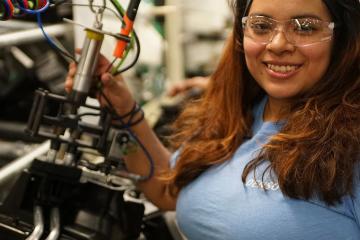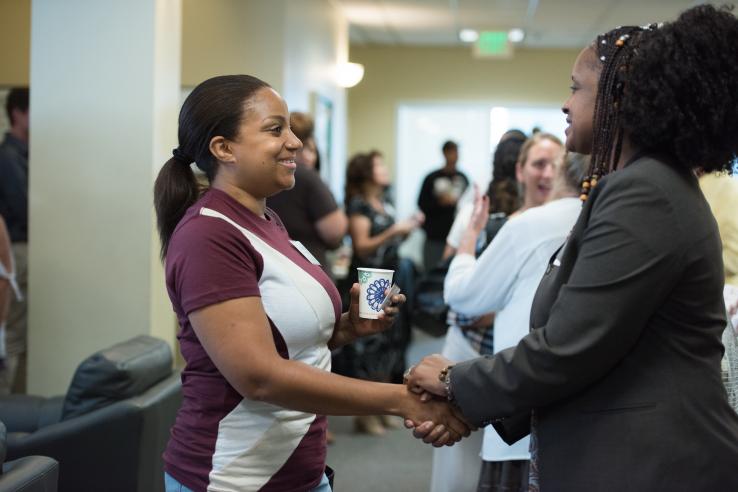
Building an Initiative: J-PAL North America Brings Rigorous Research to the Work of the Future Conversation

Automation, artificial intelligence, and other new technologies have the potential to make work more efficient and expand the possibilities of what we can do and create. These same technologies, however, have serious implications for the future of our economy and labor market: some jobs will become obsolete, while others will be created. With the rise in income inequality and stagnating educational attainment, these shifts are likely to disproportionately harm lower-wage workers. From newspaper headlines to the presidential debate stage, public discourse on the work of the future has surged in recent years with many voicing great concern.
Across the country, policymakers, industry leaders, and social service providers are actively seeking potential solutions to these challenges. While innovative approaches—from portable benefits to targeted job retraining—may hold promise, many well-intentioned ideas remain unproven, leaving policymakers without the necessary evidence to assess whether they will be helpful, neutral, or harmful. Last year, J-PAL North America launched the Work of the Future Initiative to bring rigorous research into the conversation.
In April, we convened academic experts, philanthropic and private sector partners, and representatives from government and non-profit organizations to launch the Work of the Future Initiative. The day-long event was filled with panels, presentations, and productive conversation. Matthew Notowidigdo, a J-PAL affiliate and co-chair of the initiative, presented the initiative's research agenda co-authored with co-chair David Autor and Anran Li, synthesizing the rigorous research to date on the work of the future and identifying areas requiring further research. Sarita Gupta, then Co-Executive Director of Jobs With Justice, challenged the audience to center working people in the conversation.
The goal of the launch was to bring together thought leaders from across sectors seeking to support workers in the face of the shifting labor market. For months following the event, we continued to cultivate relationships with attendees, expand outreach to new organizations, and build upon the energy and momentum inspired by the day’s discussions, all in the hopes of finding potential partners to apply to our Work of the Future Innovation Competition.
J-PAL’s proven innovation competition model catalyzes research that is most relevant to practitioners and policymakers by directly involving them in the process. Organizations with innovative programs or strategies to mitigate the burden caused by the changing nature of work were invited to submit letters of interest. After receiving several promising proposals, we selected four partners: the Center for Work, Education and Employment; Checkr; the City of Los Angeles; and Montana Department of Labor & Industry. Over the course of the coming year, J-PAL staff will work alongside these organizations to think through and design randomized evaluations of their programs and policies.
"It's exciting to see so many promising proposals in just the first year of the initiative," says Lawrence Katz, co-scientific director of J-PAL North America and academic advisor to the Work of the Future Initiative. "We're hopeful that the initiative can continue to generate this level of enthusiasm as it seeks to develop promising programs and identify effective methods to help workers navigate the shifting labor market."
Engaging in research and leveraging data is essential to the success of many organizations. Barabara Wagner, Chief Economist for the Montana Department of Labor & Industry, emphasizes that using data and research allows the department to have a greater impact on workers, businesses, and the economy by focusing resources on the best solutions. This is true for both public sector and private sector partners. At Checkr, the organization’s Co-Founder and CEO Daniel Yanisse views rigorous research as a tool to develop better products as the company hopes to ensure a fairer, more inclusive hiring process for its clients.
While research can be a powerful tool, organizations ranging from small nonprofits to large government agencies often face barriers that hinder them from meaningfully leveraging research and data in their operations and decision-making. In partnering with J-PAL, organizations have the opportunity to shape their engagement with J-PAL to best address their challenges and needs. This can include customized training efforts to grow partners’ internal capacity to design and run randomized evaluations long after the partnership with J-PAL has ended. “We’re excited about the training that J-PAL will provide to support the professional development of our team and expand our capacity to conduct more robust policy evaluations,” says Amanda Daflos, Chief Innovation Officer in the Los Angeles Mayor’s Office.
For many organizations, partnering with J-PAL is a unique opportunity to engage in rigorous research. As Katy Hamilton, Chief Executive Officer of the Center for Work, Education and Employment (CWEE), says, “It’s rare for a nonprofit of our size to have an opportunity like this to learn from the foremost thinkers in the space of academic assessments and social programs.” Hamilton adds, “I hope that the team here at CWEE is able to learn, and then we can apply those learnings to the work that we’re doing. We can really exhaust a cadence of doing that month over month, year over year and be an example for the field.”
Each selected partner brings new and promising approaches to pressing questions related to the work of the future. As we collaborate with them over the next year, we hope to catalyze new research and identify generalizable insights that will have implications far beyond their original contexts.
These new partnerships, as well as the two randomized evaluations the initiative has funded to date through our researcher-facing requests for proposals, are just the beginning of the impact that the Work of the Future Initiative hopes to have. As the initiative continues to grow, our hope is to re-shape the conversations surrounding supporting workers and the shifting labor market to center rigorous evidence and the valuable lessons it can teach us.
To stay informed about our work in this space, subscribe to our Work of the Future Initiative mailing list and the J-PAL North America monthly newsletter.
